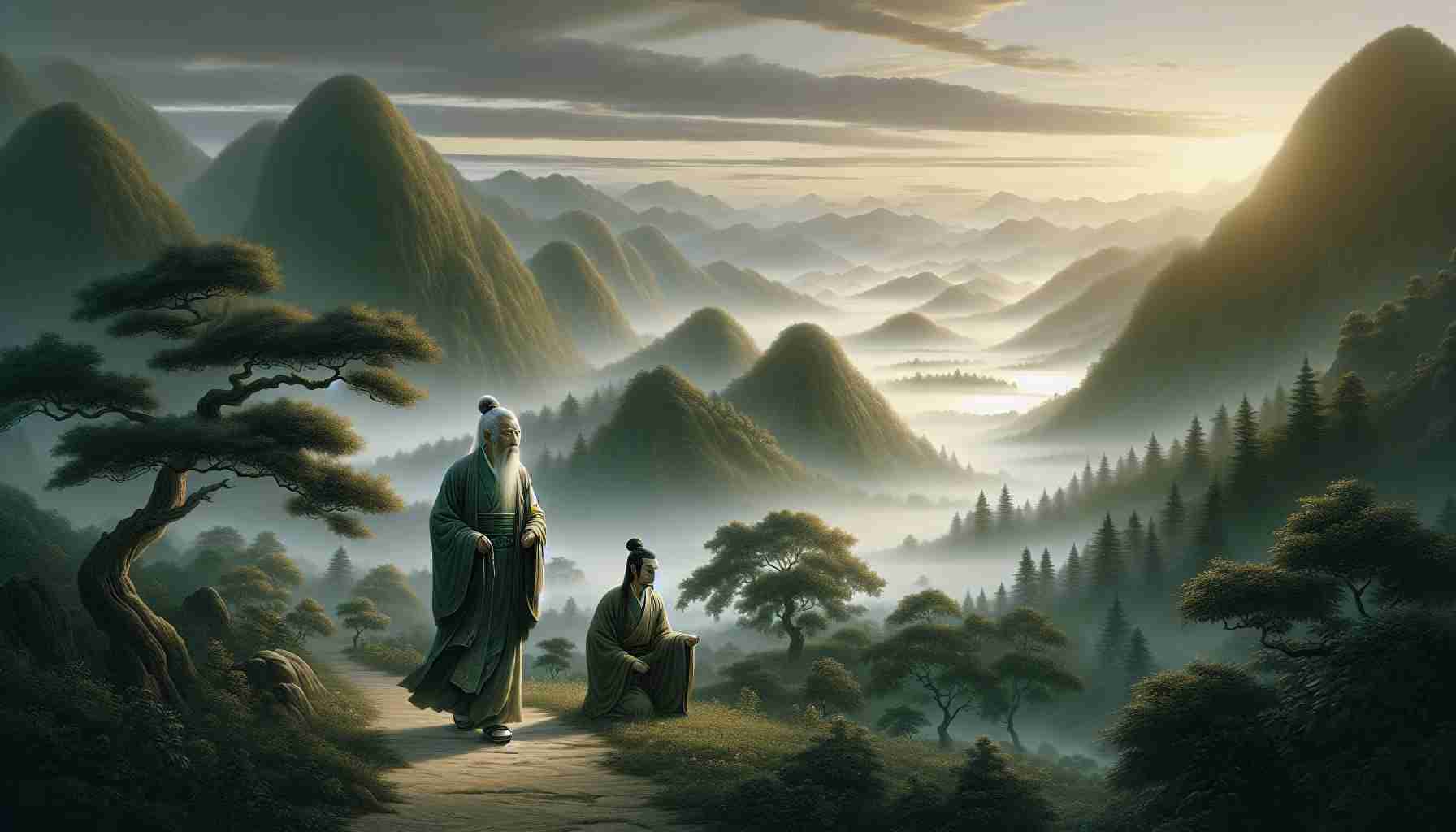

The day Laozi left the city, the sky was soft with morning mist. The townspeople didn’t know he was going. He carried no cart, wore no fine robes—just plain clothes and a calm heart. He had served as a wise keeper of the Emperor’s library, but now, he was tired of noise and busyness. He wanted to be with the mountains, the wind, and the quiet. His name was Laozi, which means “Old Master,” and though he didn’t speak much, his heart held deep wisdom.
As he walked west toward the borders of China, the road grew empty. Birds sang. Rivers whispered. Each step was slow and gentle. Laozi did not hurry. He had lived long enough to know that the world moves best when not forced.
That day, Laozi came to a pass between two tall mountains. There stood a border guard named Yin Xi. He was not a great warrior or scholar. But when he saw Laozi coming, something stirred inside him, like wind moving across a still pond.
“Where do you go, Wise One?” Yin Xi asked.
"To where the Tao takes me," Laozi replied quietly.
Yin Xi bowed. “Please,” he said, “before you disappear into the mountains, write down your wisdom. The people have forgotten how to live simply and with peace.”
Laozi looked at the mountains, then back at Yin Xi. He nodded and sat under a nearby tree.
There, with the sound of the wind and birds all around, Laozi wrote seventy-five short pages. He called it the Tao Te Ching—“The Book of the Way and its Power.”
He wrote things like, “The soft overcomes the hard.” And, “A journey of a thousand miles begins with a single step.” And, “Without doing, nothing is left undone.”
Every word came not from trying, but from letting go. That is what he taught: wu wei—non-action, or the gentle way of letting things flow.
He also taught ziran—the natural way. “A tree does not grow by force,” he said. “It grows by being what it is.”
When the book was finished, he placed the bamboo scrolls into Yin Xi’s hands. “This is not a rulebook,” he said. “Just a guide for seeing the world clearly.”
Then Laozi smiled, bowed, and continued walking west. Some say he walked until he reached the heavens. Some say he became one with the Tao.
But his words stayed behind.
People across China began reading them. Farmers, monks, teachers, even kings. The Tao Te Ching helped them find quiet in noise, peace in a storm, stillness in movement.
Laozi’s lesson was this: You don’t need to control everything. The Tao—the Way—works best when we move with it, not against it.
So even today, in busy cities and quiet valleys, people remember the quiet man who didn’t want fame, but left behind a path to peace.
And though he disappeared into the mountains, the Tao he shared continues to flow—soft as water, and just as strong.
The day Laozi left the city, the sky was soft with morning mist. The townspeople didn’t know he was going. He carried no cart, wore no fine robes—just plain clothes and a calm heart. He had served as a wise keeper of the Emperor’s library, but now, he was tired of noise and busyness. He wanted to be with the mountains, the wind, and the quiet. His name was Laozi, which means “Old Master,” and though he didn’t speak much, his heart held deep wisdom.
As he walked west toward the borders of China, the road grew empty. Birds sang. Rivers whispered. Each step was slow and gentle. Laozi did not hurry. He had lived long enough to know that the world moves best when not forced.
That day, Laozi came to a pass between two tall mountains. There stood a border guard named Yin Xi. He was not a great warrior or scholar. But when he saw Laozi coming, something stirred inside him, like wind moving across a still pond.
“Where do you go, Wise One?” Yin Xi asked.
"To where the Tao takes me," Laozi replied quietly.
Yin Xi bowed. “Please,” he said, “before you disappear into the mountains, write down your wisdom. The people have forgotten how to live simply and with peace.”
Laozi looked at the mountains, then back at Yin Xi. He nodded and sat under a nearby tree.
There, with the sound of the wind and birds all around, Laozi wrote seventy-five short pages. He called it the Tao Te Ching—“The Book of the Way and its Power.”
He wrote things like, “The soft overcomes the hard.” And, “A journey of a thousand miles begins with a single step.” And, “Without doing, nothing is left undone.”
Every word came not from trying, but from letting go. That is what he taught: wu wei—non-action, or the gentle way of letting things flow.
He also taught ziran—the natural way. “A tree does not grow by force,” he said. “It grows by being what it is.”
When the book was finished, he placed the bamboo scrolls into Yin Xi’s hands. “This is not a rulebook,” he said. “Just a guide for seeing the world clearly.”
Then Laozi smiled, bowed, and continued walking west. Some say he walked until he reached the heavens. Some say he became one with the Tao.
But his words stayed behind.
People across China began reading them. Farmers, monks, teachers, even kings. The Tao Te Ching helped them find quiet in noise, peace in a storm, stillness in movement.
Laozi’s lesson was this: You don’t need to control everything. The Tao—the Way—works best when we move with it, not against it.
So even today, in busy cities and quiet valleys, people remember the quiet man who didn’t want fame, but left behind a path to peace.
And though he disappeared into the mountains, the Tao he shared continues to flow—soft as water, and just as strong.